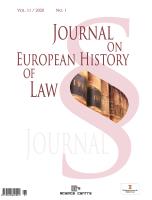The Failure of the Weimar Constitution: Institutional Keys and Lessons to be Drawn
The Failure of the Weimar Constitution: Institutional Keys and Lessons to be Drawn
Author(s): David Parra GomézSubject(s): History, Law, Constitution, Jurisprudence
Published by: Evropská společnost pro právní dějiny, z.s.
Keywords: Weimar Republic; Germany; constitution; constitutional framework.
Summary/Abstract: The Weimar Constitution is a milestone in the history of constitutionalism, being the founding document of a new historical type of constitution that came to replace the liberal constitution of the nineteenth century: the democratic and social constitution, which has been acting as a model to imitate in the “second moment” of democratic constitutionalism, identified with the values and principles of the Social State of Law. It was not, therefore, the text, but the economic, social and political context of the Weimar Republic that determined its tragic fate. However, it is no less true that certain institutions and constitutional structures contributed significantly to its inability to exercise an effective integrative function and to consolidate a democratic republic in Germany.
Journal: Journal on European History of Law
- Issue Year: 11/2020
- Issue No: 1
- Page Range: 188-193
- Page Count: 6
- Language: English

